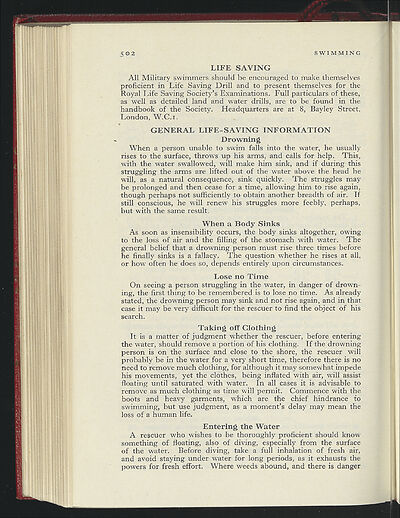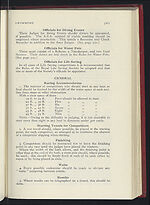1938-39
(532)
Download files
Complete book:
Individual page:
Thumbnail gallery: Grid view | List view

502 SWIMMING
LIFE SAVING
All Military swimmers should be encouraged to make themselves
proficient in Life Saving Drill and to present themselves for the
Royal Life Saving Society's Examinations. Full particulars of these,
as well as detailed land and water drills, are to be found in the
handbook of the Society. Headquarters are at 8, Bayley Street,
London, W.C.I.
•
GENERAL LIFE-SAVING INFORMATION
Drowning
When a person unable to swim falls into the water, he usually
rises to the surface, throws up his arms, and calls for help. This,
with the water swallowed, will make him sink, and if during this
struggling the arms are lifted out of the water above the head he
will, as a natural consequence, sink quickly. The struggles may
be prolonged and then cease for a time, allowing him to rise again,
though perhaps not sufficiently to obtain another breadth of air. If
still conscious, he will renew his struggles more feebly, perhaps,
but with the same result.
When a Body Sinks
As soon as insensibility occurs, the body sinks altogether, owing
to the loss of air and the filling of the stomach with water. The
general belief that a drowning person must rise three times before
he finally sinks is a fallacy. The question whether he rises at all,
or how often he does so, depends entirely upon circumstances.
Lose no Time
On seeing a person struggling in the water, in danger of drown-
ing, the first thing to be remembered is to lose no time. As already
stated, the drowning person may sink and not rise again, and in that
case it may be very difficult for the rescuer to find the object of his
search.
Taking off Clothing
It is a matter of judgment whether the rescuer, before entering
the water, should remove a portion of his clothing. If the drowning
person is on the surface and close to the shore, the rescuer will
probably be in the water for a very short time, therefore there is no
need to remove much clothing, for although it may somewhat impede
his movements, yet the clothes, being inflated with air, will assist
floating until saturated with water. In all cases it is advisable to
remove as much clothing as time will permit. Commence with the
boots and heavy garments, which are the chief hindrance io
swimming, but use judgment, as a moment's delay may mean the
loss of a human life.
Entering the Water
A rescuer who wishes to be thoroughly proficient should know
something of floating, also of diving, especially from the surface
of the water. Before diving, take a full inhalation of fresh air,
and avoid staying under water for long periods, as it exhausts the
powers for fresh effort. Where weeds abound, and there is danger
LIFE SAVING
All Military swimmers should be encouraged to make themselves
proficient in Life Saving Drill and to present themselves for the
Royal Life Saving Society's Examinations. Full particulars of these,
as well as detailed land and water drills, are to be found in the
handbook of the Society. Headquarters are at 8, Bayley Street,
London, W.C.I.
•
GENERAL LIFE-SAVING INFORMATION
Drowning
When a person unable to swim falls into the water, he usually
rises to the surface, throws up his arms, and calls for help. This,
with the water swallowed, will make him sink, and if during this
struggling the arms are lifted out of the water above the head he
will, as a natural consequence, sink quickly. The struggles may
be prolonged and then cease for a time, allowing him to rise again,
though perhaps not sufficiently to obtain another breadth of air. If
still conscious, he will renew his struggles more feebly, perhaps,
but with the same result.
When a Body Sinks
As soon as insensibility occurs, the body sinks altogether, owing
to the loss of air and the filling of the stomach with water. The
general belief that a drowning person must rise three times before
he finally sinks is a fallacy. The question whether he rises at all,
or how often he does so, depends entirely upon circumstances.
Lose no Time
On seeing a person struggling in the water, in danger of drown-
ing, the first thing to be remembered is to lose no time. As already
stated, the drowning person may sink and not rise again, and in that
case it may be very difficult for the rescuer to find the object of his
search.
Taking off Clothing
It is a matter of judgment whether the rescuer, before entering
the water, should remove a portion of his clothing. If the drowning
person is on the surface and close to the shore, the rescuer will
probably be in the water for a very short time, therefore there is no
need to remove much clothing, for although it may somewhat impede
his movements, yet the clothes, being inflated with air, will assist
floating until saturated with water. In all cases it is advisable to
remove as much clothing as time will permit. Commence with the
boots and heavy garments, which are the chief hindrance io
swimming, but use judgment, as a moment's delay may mean the
loss of a human life.
Entering the Water
A rescuer who wishes to be thoroughly proficient should know
something of floating, also of diving, especially from the surface
of the water. Before diving, take a full inhalation of fresh air,
and avoid staying under water for long periods, as it exhausts the
powers for fresh effort. Where weeds abound, and there is danger
Set display mode to:
![]() Universal Viewer |
Universal Viewer | ![]() Mirador |
Large image | Transcription
Mirador |
Large image | Transcription
| Games and sports in the army > 1938-39 > (532) |
|---|
| Permanent URL | https://digital.nls.uk/248743522 |
|---|
| Description | 'Games and Sports in the Army' was an annual publication produced by the British War Office between the 1930s and 1960s. This included the Second World War. It outlines the rules and regulations for games and sports played by members of the armed forces. It features names and photographs of team members, and examples of contemporary advertising. |
|---|---|
| Shelfmark | GWB.52 |

